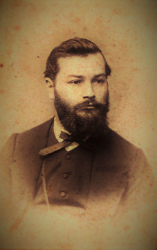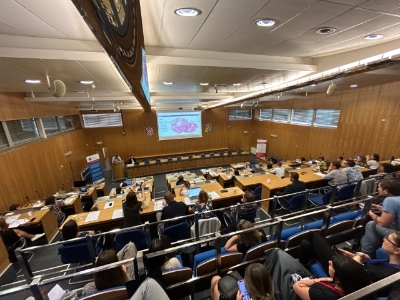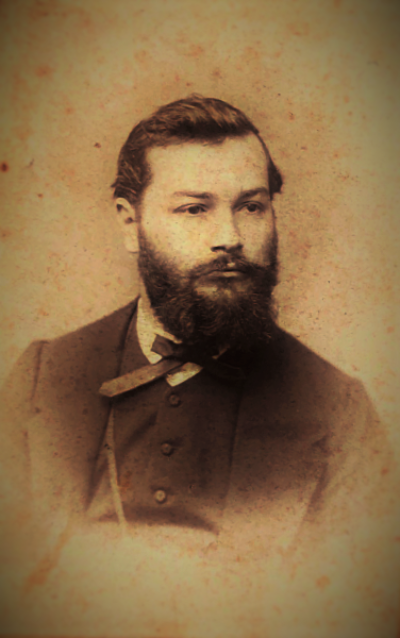
Elite of month – Gall, Iosif (1839–1912), judge, deputy, philanthropist
Iosif Gall (1839–1912) – judge, deputy, philanthropist
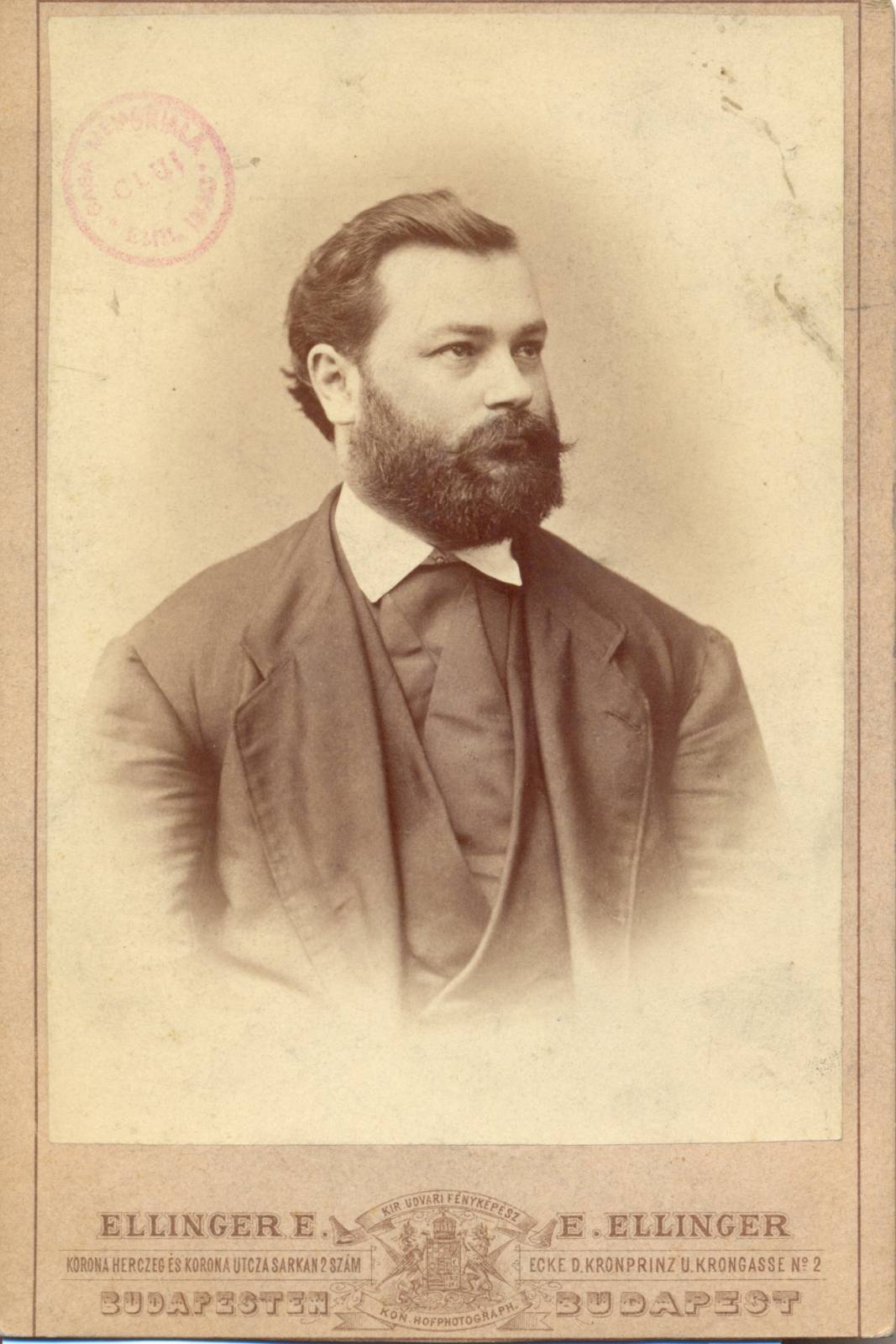
Iosif Gall (Bistrița-Năsăud County Branch of the Romanian State Archives)
On Christmas Eve in 1870, the Metropolitan Bishop of the Romanian Orthodox Church in Transylvania, Andrei Șaguna (1809–1876), wrote to a close friend about the marriage of one of the most valuable jurists of Dualist Hungary of that time, Dr. Iosif Gall:
"What do you know of Gall and his companionship or marriage? I have written to him that Dunca will give his daughter away now with [a dowry of] 12,000 fl. alongside anything that will be left after his death, to be divided into three parts, among his three daughters; and he will not answer me; and Dunca grows impatient, for he wants to know, will anything come of it or nothing? Some people are maddened by good fortune; I fear lest this fate has befallen Gall also."
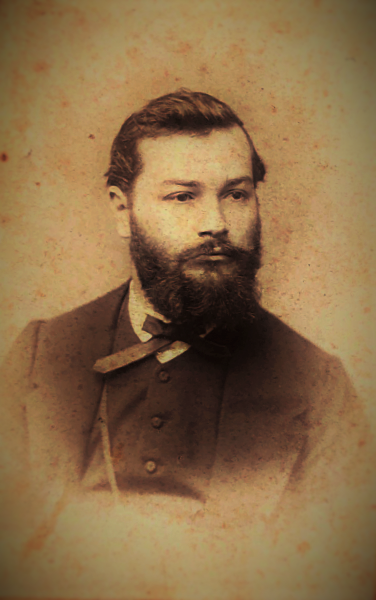
Iosif Gall (“Octavian Goga” Cluj County Library)
The Romanian high clergyman, an emblematic figure of the national movement in Transylvania, whose influence even reached the circles of the Viennese Court, was concerned with Iosif Gall's fate ever since the latter had been orphaned at the age of 12. Iosif's father, the Orthodox archpriest Grigore Gall (?–1851), had died in 1851, leaving his wife, Carolina (née Stan de Borosjenő) (1814–1904), a widow with four children.
With the support of Andrei, Baron of Șaguna, Iosif Gall had managed to attend secondary school in Cluj (Hu. Kolozsvár) and obtain a higher education at the Academy of Law in Sibiu (hu. Nagyszeben) and the University of Vienna. The metropolitan bishop's support – especially financial support, but not limited to material issues – was fully rewarded by the young Iosif Gall in 1860, when the student was awarded a doctorate in law at the university in the imperial capital.
After finishing his studies, Iosif Gall began his professional career, which progressed at a fast pace, in line with his legal skills and knowledge. In Vienna, for a year after obtaining his doctorate, he completed a compulsory legal traineeship to qualify as a lawyer. Immediately after the end of this period he was appointed as a trainee at the Transylvanian Court of Vienna. Due to his admirable activity, he was shortly afterwards promoted to a superior office within the same institution. In 1867, with the administrative changes brought by the Ausgleich, Iosif Gall was transferred to the Royal Hungarian Ministry of Justice. A year later, in 1868, he was transferred again to the Transylvanian supreme court, and with its dissolution to one of the higher courts in Budapest (Hu. Hétszemélyes Tábla), where he was assigned to the Transylvanian division. After only one year he was appointed report on the proceedings at the Court of Cassation, and in 1870, when he was only 32 years old, he became a judge at the King’s Bench in Budapest. Shortly afterwards he returned to the Court of Cassation as a counselor.
This period of his life, which was marked by outstanding achievements, also witnessed Andrei Șaguna’s efforts to see him settled from a personal perspective as well as a professional one. In 1871 Gall became engaged to Paulina Dunca, daughter of Paul Dunca (1800–1888) from Sibiu, a former government councilor and MP. The marriage between the two, however, never took place because of disputes between Iosif Gall and Paul Dunca, most probably concerning the young girl's dowry.
Eventually, eight years later, his professional fulfillment was matched by a personal one through his marriage to Ecaterina of Agora (?–1899), a widow who owned important possessions in Banat and Croatia. She had previously been wed to Ioan Dobran, from whom she had inherited an important estate. Ecaterina Gall de Agora came from an old family of Aromanian origin settled in Banat. She was also the owner of a large estate at Lucareț (Hu. Lukarec). In Budapest she enjoyed wide popularity and was considered one of the capital's greatest philanthropists thanks to the balls organized to support the Romanian students at the local university. Seen from the perspective of his wife's social status, Gall's marriage, but especially the break-up of the engagement with Paulina Dunca, shows that the young Romanian jurist had thought out his marriage strategy with the utmost pragmatism.
In fact, the results of this social ascent, which complemented his professional one, leveled the way for his career to divert towards politics. In 1881, Iosif Gall resigned from his post as an adviser to the Court of Cassation and gave up his pension, convinced that he could better serve his nation if he were to work in the political arena. On his retirement from the civil service, he was awarded the Order of the Iron Crown Class III and later the Order of Franz Joseph in the rank of Grand Officer.
In the same year he filed his candidacy for the parliamentary deputy of the Recaș (Hu. Rékas) constituency, Temes county, as a supporter of the government program. After winning the elections, he represented this electoral constituency throughout the whole parliamentary cycle 1881–1884. During this period, he was a member of the Parliament's Justice Committee and its rapporteur. In the elections of 1884, he stood again and managed to win another mandate as a Member of Parliament. The 1884–1887 parliamentary cycle was the last of his career in the Lower House of the Hungarian Parliament, as in May 1887 he was appointed lifetime member of the House of Magnates, the Upper House of the Budapest Parliament. He served in this capacity until the end of his life.
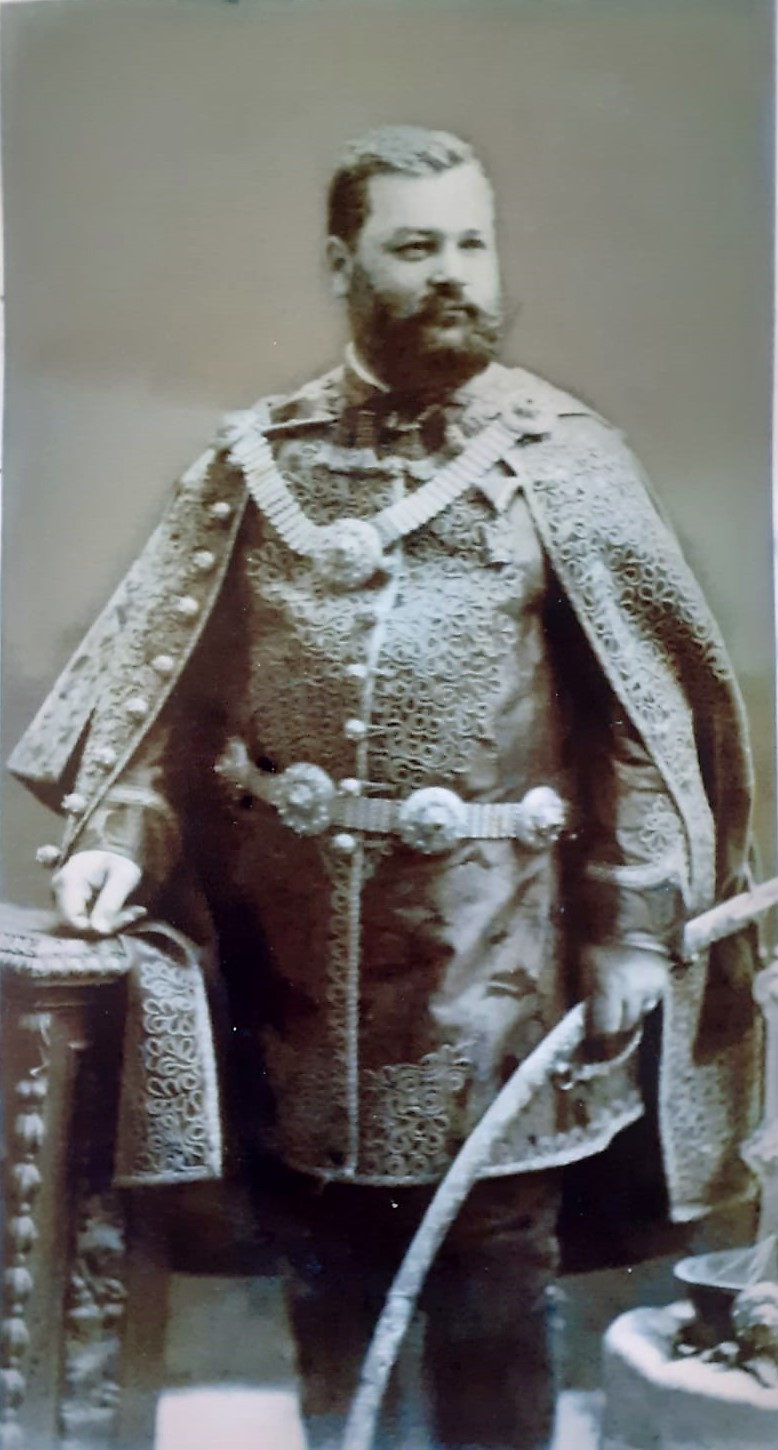
Iosif Gall’s as a magnate (Ovidiu Emil Iudean’s personal archive)
One of the most important political endeavors of Iosif Gall's career was the founding of the Romanian Moderate Party, together with the Orthodox Metropolitan bishop Miron Romanul (1828–1898). The organization of the Moderate conference in Budapest in March 1884 and his financial support for the Viitorul [The Future] gazette, the press organ of the newly founded party, are just two of the reasons for his full involvement in this political project. Despite the failure of the moderates, Gall remained convinced of the need for the Romanian nation in Hungary to adopt a moderate course of cooperation with the Hungarian government to achieve social, cultural and ecclesiastical development.
Iosif Gall died in Budapest on the night of October 17/30 to 18/31, 1912. He was buried in Cluj on October 21/November 3 in the presence of his family and a large public. As he had no direct heirs, in his will he left a large part of his estate, about 600,000 crowns, to set up two foundations, both under the name "Agora-Gall", for cultural and philanthropic purposes. Each of the two was to be administered separately, one by the Romanian Orthodox Church in Transylvania and the other by the Serbian Orthodox Church, residing in Karlovci.
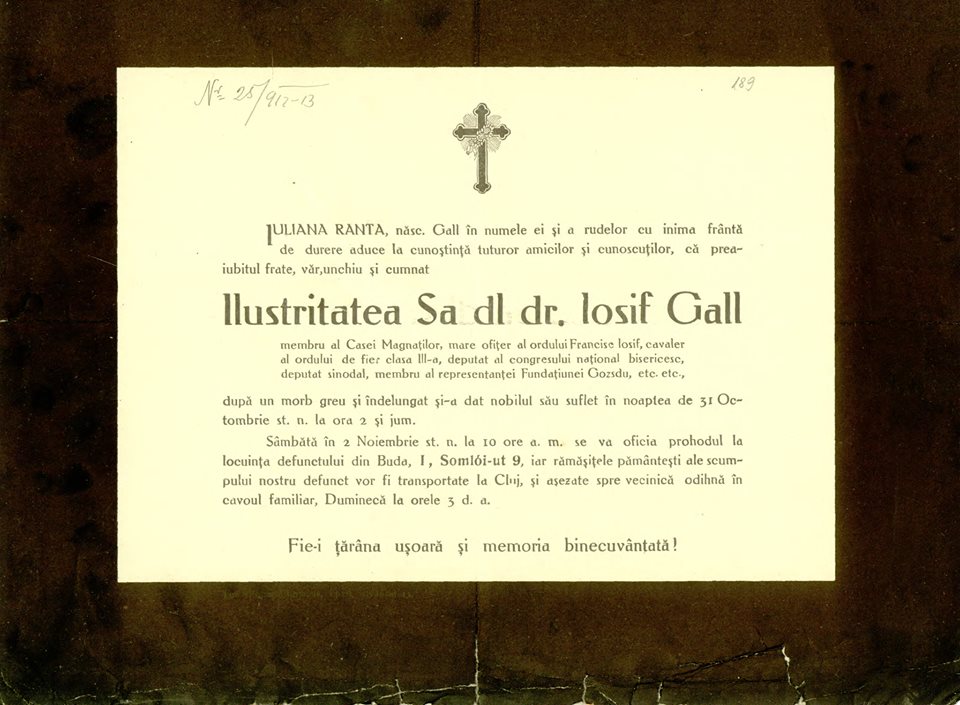
Iosif Gall’s obiturary (Bistrița-Năsăud County Branch of the Romanian State Archives)
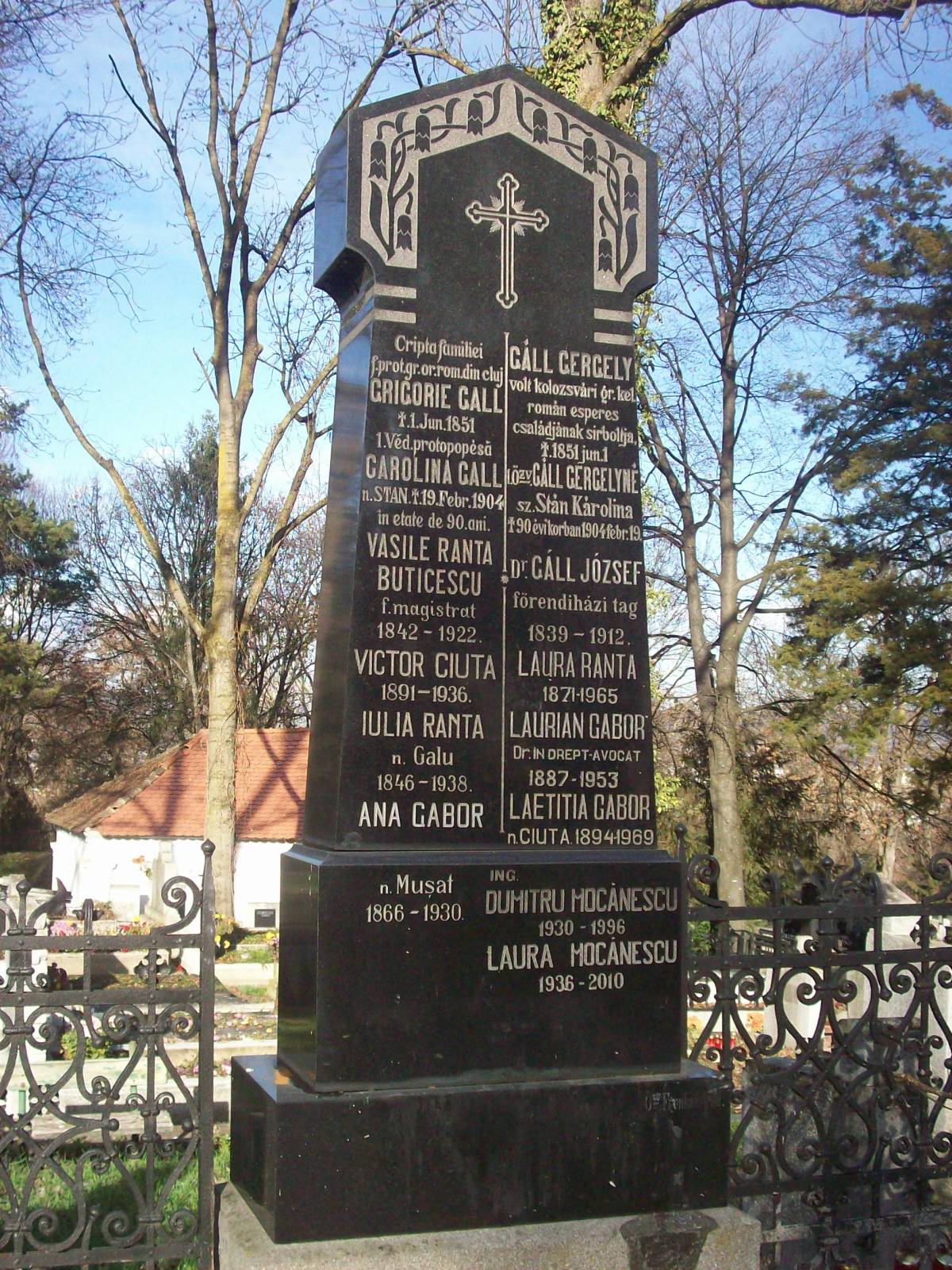
Iosif Gall’s grave (Ovidiu Emil Iudean’s personal archive)
Owing to this last grand gesture, as well as all his legal, social-cultural and political activity, his biographer, T. V. Păcățian (1852–1941), rightfully called him "The Lucareț Maecena".
Bibliography:
Păcăţian Teodor V., Iudean Ovidiu Emil, Un mecenat român – dr. Iosif Gall (Cluj-Napoca : Presa Universitară Clujeană, 2012)
Iudean Ovidiu Emil, The Romanian governmental representatives in the Budapest Parliament (1881–1918). Cluj-Napoca : Mega, 2016
Berényi Maria, Personalităţi marcante în istoria şi cultura românilor din Ungaria (secolul XIX) (Giula: Institutul de Cercetări al Românilor din Ungaria, 2013)
